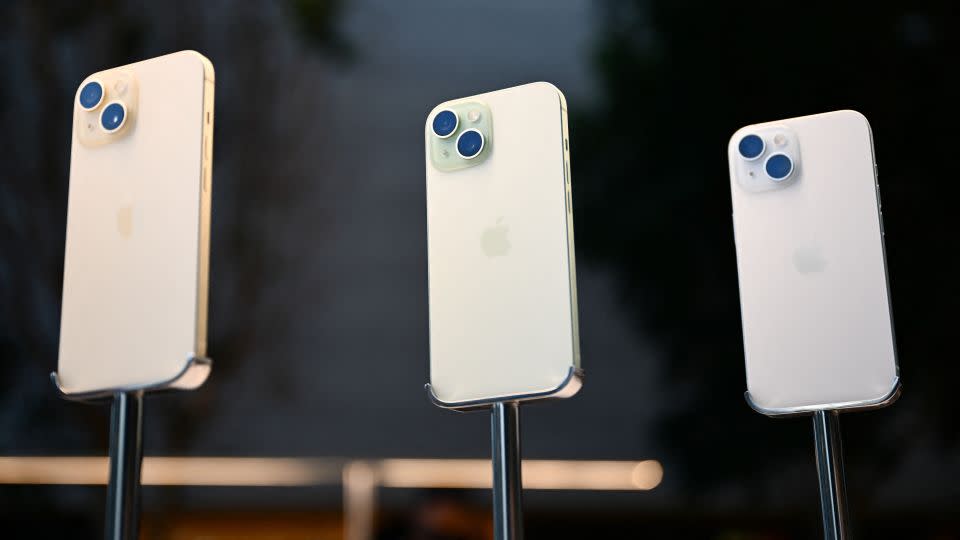Apple customers love Apple. The Biden administration thinks they could do better

Editor’s Note: A version of this story appeared in CNN Business’ Nightcap newsletter. To get it in your inbox, sign up for free, here.
The Justice Department’s lawsuit against Apple wants to break the company’s notoriously tight grip on the iPhone, the device that’s made it one of the biggest and most profitable companies on the planet.
But regardless of what happens in court, the case is already shining a light on the two faces of Apple: the cool, high-end tech brand that customers adore; and the ruthless, unavoidable behemoth that developers loathe.
Here’s the deal: The Feds say Apple is maintaining a monopoly that stifles competition, deprives consumers of choice and ultimately forces them to pay more.
Apple’s response to the allegations is, more or less, a) no we don’t, and b) good luck proving customer harm when everybody loves us.
And that’s where this Goliath versus Goliath battle gets interesting.
Customers really like Apple. We love the phones, the watches, the laptops and the AirPods that ensure we never have to be alone with our thoughts (unless, heaven help you, you forgot to charge them). Heck, I’m typing this article on an Apple keyboard connected to a MacBook connected to iCloud, and I would throw a fit if I had to switch to a PC.
Apple even nodded to this in its widely circulated statement to the media Thursday:
“We innovate every day to make technology people love – designing products that work seamlessly together, protect people’s privacy and security, and create a magical experience for our users.”
Magical!
The company added: “This lawsuit threatens who we are and the principles that set Apple products apart in fiercely competitive markets.”
And it’s true — the gods saw fit to get Steve Jobs and Jony Ive (the revered product designer behind Apple’s biggest hits) in the same room at the same time, and the world was never the same.
Their products married good design and good software. They were never cheap, but they were shiny, user-friendly, simply beautiful. With help from the best marketing team in Silicon Valley history, Apple became a tech icon with a billion devotees.
The darker side of Apple
But on the business side, Apple is not so beloved.
The company has a reputation for quashing competition and squeezing developers with exorbitant fees. Many smaller tech companies hate Apple as much as they live in fear of its lawyers.
“Apple has this practice of seeing what others innovate for the phone, copying it, and then making it so that those others can’t compete,” Adam Wolfson, an antitrust lawyer with the firm Quinn Emanuel, told me. (There’s even an industry term for when Apple appropriates a third party’s tech, called “Sherlocking” — a nod to one of Apple’s search products that rendered its non-Apple rival, Watson, redundant.)
“They very much have an approach to being about as sharp-elbowed as you can possibly get,” said Wolfson, who has represented clients in Apple disputes. “Apple is extraordinarily litigious, and will fight to the very last breath, because it can.”
The DOJ lawsuit argues Apple has illegally monopolized smartphone markets by blocking innovative new apps and services.
If you’re an iPhone user and you’ve ever been in a text thread with someone using an Android device, you know the green-bubble problem and how annoying it is. It’s not as if Apple can’t make that experience better, according to the DOJ — it just doesn’t want to, because it’s better for Apple if its users see Android as a social faux pas. It’s tech tribalism, and Apple is a master at cultivating loyalty.
The green bubble issue is just one of several ways Apple is abusing its dominant position, according to the lawsuit. (My colleague David Goldman has more on that here.)
If it succeeds, the Justice Department could force Apple to loosen some of the restrictions it has placed on its “walled garden” approach, which Apple says is meant to create a seamless experience for users and keep them relatively safe from viruses.
That is a concern for investors, says Gene Muster, managing partner at Deepwater Asset Management, because the lawsuit goes after “the juiciest part of their business.”
But Muster doesn’t expect the lawsuit to be a body blow for the company, and believes “people will still gravitate to Apple products.”
Indeed, customer satisfaction is, paradoxically, a tricky issue for the DOJ as well. People are pretty content with their iPhones. Could we be more content with more competition? Maybe. The DOJ will have their work cut out for them trying to prove it.
Ultimately, Wolfson said, “the law wants to make sure that consumers are getting the absolute best, not just what Apple decides we want.”
For more CNN news and newsletters create an account at CNN.com
